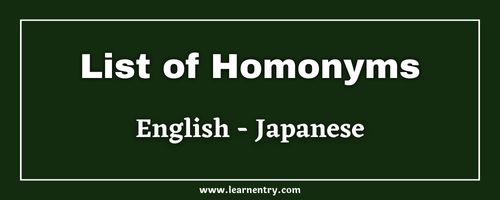List of Homonyms in Japanese and English
To learn Japanese language, common vocabulary is one of the important sections. Common Vocabulary contains common words that we can used in daily life. If you are interested to learn Japanese language, this place will help you to learn Japanese words like Homonyms in Japanese language with their pronunciation in English.

Top Homonyms in Japanese
Here is the list of most common Homonyms with meanings in Japanese language with English pronunciations.
アクセント akusento
上昇 shang sheng
受け入れる shouke rureru
それ外 sore wai
適応する shi yingsuru
採用 cai yong
助言 zhu yan
アドバイス adobaisu
空気 kong qi
相続人 xiang xu ren
許可された xu kesareta
声を出して shengwo chushite
改める gaimeru
アプレピタント apurepitanto
鑑定 jian ding
知らせる、報告する zhiraseru, bao gaosuru
その間 sono jian
置き場 zhiki chang
それ以外 sore yi wai
そのほか sonohoka
より良い yori liangi
ベッター betta
イノシシ inoshishi
退屈させる tui qusaseru
バスに乗った basuni chengtta
バスト basuto
キャッシュ kyasshu
現金 xian jin
資本 zi ben
国会議事堂 guo hui yi shi tang
シーリング shiringu
シーリング shiringu
小切手 xiao qie shou
小切手 xiao qie shou
補体 bu ti
褒め言葉 baome yan ye
警官 jing guan
雑木林 za mu lin
評議会 ping yi hui
弁護士 bian hu shi
クラフト kurafuto
クラフト kurafuto
ちりめん chirimen
クレープ kurepu
フェイント feinto
かすかな kasukana
飛んだ feinda
インフルエンザ infuruenza
チラシ chirashi
チラシ chirashi
子馬 zi ma
折り畳み zheri diemi
ゴレッド goreddo
ひょうたん hyoutan
グラフ化 gurafu hua
グラフト gurafuto
すりおろす suriorosu
すごい sugoi
うめき声 umeki sheng
成長した cheng zhangshita
より高い yori gaoi
雇用 gu yong
時間 shi jian
私たちの sitachino
扇動する shan dongsuru
洞察 dong cha
混雑する hun zasuru
わき柱 waki zhu
知っていた zhitteita
新着 xin zhe
リース risu
少しでも shaoshidemo
朝 chao
喪に服する sangni fusuru
新着 xin zhe
知っていた zhitteita
パッド入り paddo ruri
たたく tataku
バケツ baketsu
青白い qing baii
プレーン puren
飛行機 fei xing ji
縫い目 fengi mu
思われる siwareru
縫う fengu
種をまく zhongwomaku
急上昇 ji shang sheng
痛み tongmi
階段 jie duan
見詰める jian jiemeru
踏み越し段 tami yueshi duan
スタイル sutairu
王位 wang wei
投げられた tougerareta
曳航 ye hang
ヒキガエル hikigaeru
振り向く zhenri xiangku
アジサシ ajisashi
家庭教師 jia ting jiao shi
tooter tooter
変化 bian hua
非常に fei changni
静脈 jing mai
うぬぼれが強い unuborega qiangi
イチイ ichii
使用する shi yongsuru
